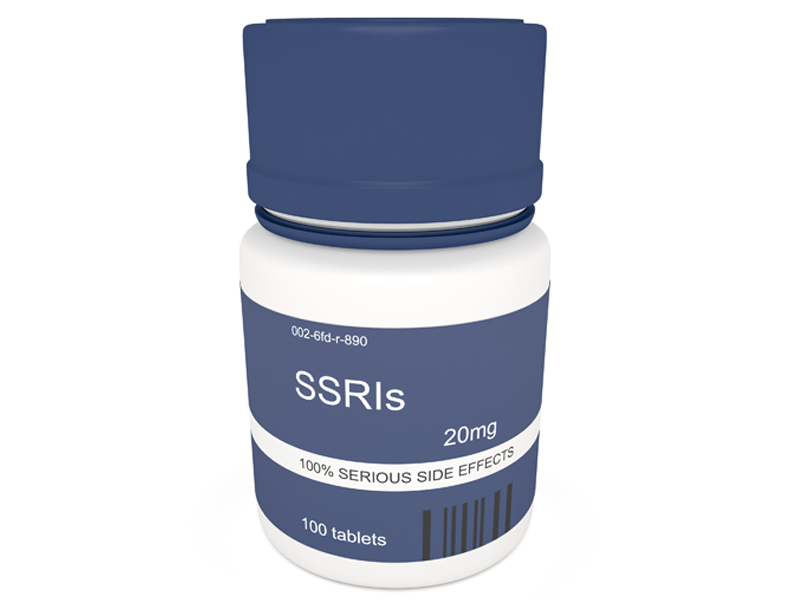Get Easy Health Digest™ in your inbox and don’t miss a thing when you subscribe today. Plus, get the free bonus report, Mother Nature’s Tips, Tricks and Remedies for Cholesterol, Blood Pressure & Blood Sugar as my way of saying welcome to the community!
The antidepressant that trades happiness for death and stroke

If your doctor gave you a medication that, instead of making your symptoms better over time, actually made them worse, you’d certainly go back to your doctor and question the wisdom of taking that medication, right?
Or maybe the medication is working “so-so” for its intended use… but after taking it you start to have other serious problems and find you’ve traded one problem for a whole new set of problems.
Well, one common type of antidepressant in particular is coming under scrutiny for the way it disrupts a range of bodily functions that are controlled by one important chemical.
Selective serotonin reuptake inhibitors (SSRIs) act like “serotonin guards,” preventing this precious chemical from being absorbed in the bloodstream and used for these other vital functions.
And that can have some serious repercussions…
Research uncovers higher risk of death with SSRIs
When researchers from McMaster University in Toronto reviewed studies involving 375,000 participants, they came away with some results that were more than disturbing…
It seems that people who take SSRIs have a 33 percent higher chance of premature death than people who don’t take them. In addition, those on the antidepressant were 14 percent more likely to have a stroke or heart attack.
Based on the way serotonin works, this actually isn’t all that surprising.
Your heart, kidneys, lungs and liver all require serotonin. Without it, or with insufficient amounts, these organs cannot carry out their vital functions completely.
Serotonin: more than a mood-booster
Serotonin is a chemical that carries messages between brain cells. It’s considered a natural mood stabilizer, and low serotonin levels are thought to cause depression.
Serotonin is the chemical acted upon by the class of antidepressants known as selective serotonin reuptake inhibitors (SSRIs).
SSRIs act against depression by blocking the brain from reabsorbing serotonin, thus keeping it active in your body.
But serotonin does some important jobs other than controlling mood:
It regulates sleep. Serotonin stimulates the parts of the brain that determine whether you are asleep or awake. Since sleep problems often accompany depression, causing an imbalance in serotonin is actually not doing you any favors.
It heals wounds. When serotonin is released from blood platelets, it causes tiny arteries to narrow, helping to form blood clots.
It affects bone health. Too much serotonin in the bones can lead to osteoporosis.
It controls libido. Low serotonin levels are associated with increased libido, while increased levels are associated with reduced libido.
It causes nausea. While this may seem like something you’d be willing to give up, think again. Serotonin helps cause the nausea that ultimately helps push tainted or poisonous food out of your system.
Natural ways to balance serotonin
If you are already taking an SSRI for depression or anxiety, do not stop taking it without the advice and guidance of your doctor.
But you should know that there are quite a few things you can do, today, to balance serotonin levels and help alleviate depressive symptoms, while allowing the chemical to handle its other duties, including…
Get some sunlight. Natural light has been proven effective in alleviating seasonal depression.
In one study, 98 patients with seasonal depression were assigned to 8 weeks of morning light therapy for 30 minutes at 10,000 lux and a placebo pill, or 30 minutes of dim light at 100 lux and a 20 mg Prozac pill. Both groups achieved a 67% response rate.
Take magnesium. In one clinical trial, four 500-mg tablets of magnesium chloride daily were followed by a significant reduction in symptoms of depression and anxiety.
It is known that when magnesium levels in the body are too low, depressive symptoms is not an uncommon result. It’s important to know the signs of a magnesium deficiency.
Eat some tryptophan. People with depression and anxiety routinely have low levels of this amino acid, and that these low levels are often accompanied by low serotonin.
Seven great sources of tryptophan are:
- Eggs
- Cheese
- Pineapples
- Tofu
- Salmon
- Nuts and seeds
- Turkey
Editor’s note: Did you know that when you take your body from acid to alkaline you can boost your energy, lose weight, soothe digestion, avoid illness and achieve wellness? Click here to discover The Alkaline Secret to Ultimate Vitality and revive your life today!
Sources:
- Maslej M, M, Bolker B, M, Russell M, J, Eaton K, Durisko Z, Hollon S, D, Swanson G, M, Thomson Jr. J, A, Mulsant B, H, Andrews P, W, “The Mortality and Myocardial Effects of Antidepressants Are Moderated by Preexisting Cardiovascular Disease: A Meta-Analysis.” — Psychotherapy and Psychosomatics 2017;86:268-282
- Serotonin: What You Need to Know — healthline.com
- Role of magnesium supplementation in the treatment of depression: A randomized clinical trial — PLoS One
- Hypomagnesaemia linked to depression: a systematic review and meta-analysis — Internal Medicine Journal














